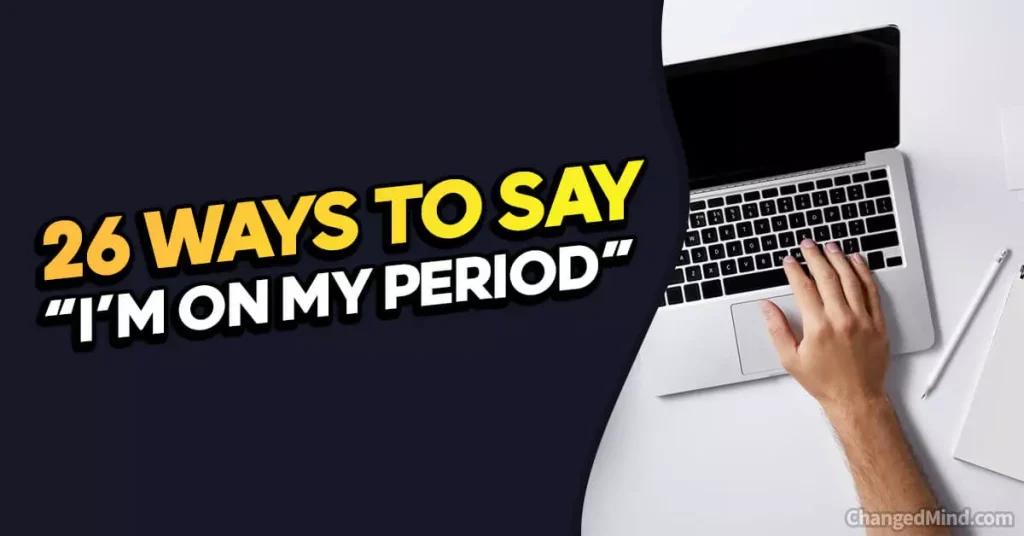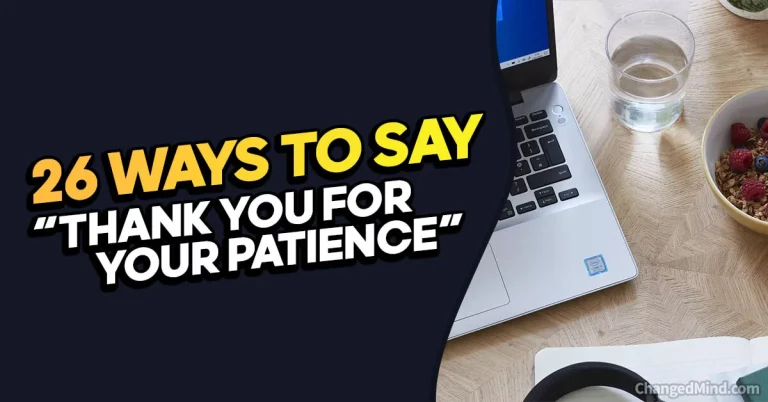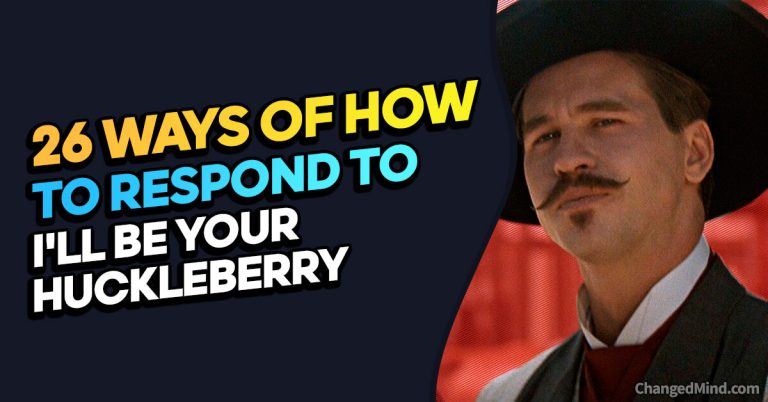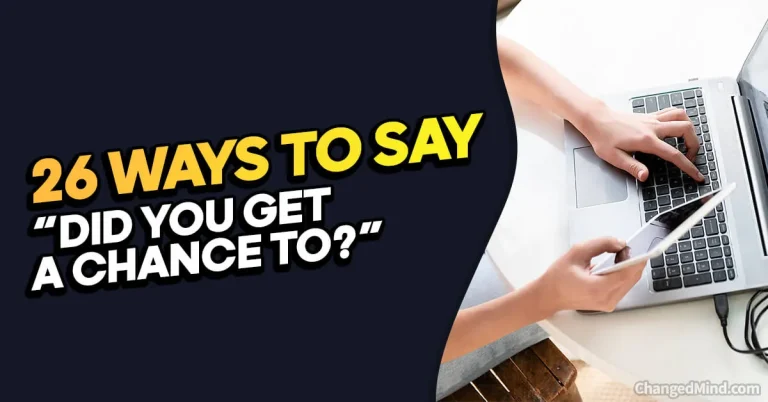Ladies and gentlemen, let’s face it – sometimes, just saying, “I’m on my period,” feels about as subtle as a bullhorn in a library.
But fret not, because we’re about to dive into the quirkiest, classiest, and most creative alternatives to declare, “Aunt Flo is in town.”
In this article, we’ll uncover 26 other ways to say “I’m on My Period,” ranging from the witty and whimsical to the downright sophisticated.
So, if you’re ready to add a sprinkle of humor and elegance to a natural conversation, stay tuned because “Other Ways to Say ‘I’m on My Period'” is about to redefine your communication game.
In this article, we’ll explore:
- Playful expressions to lighten the mood.
- Tactful ways to discuss the topic.
- Creative alternatives for a touch of humor.
- Classy and discreet phrases.
- A global perspective on period euphemisms.
Get ready to embrace the linguistic adventure ahead!
Let’s dive into the world of creative communication.
Discussing menstruation can often be met with discomfort or embarrassment due to societal stigma and personal preferences. As a result, people may seek alternative phrases to indicate that they are on their period.
These phrases serve as euphemisms that provide a subtle and sometimes light-hearted way of talking about menstruation. Some popular alternative phrases include “Aunt Flo is in town,” “It’s that time of the month,” “I’m riding the crimson wave,” “It’s shark week,” “I’m having lady troubles,” and “I’m on the rag.”

The use of alternative phrases serves various purposes. Firstly, societal stigma surrounding menstruation can make individuals uncomfortable discussing the topic openly. Using alternative phrases helps alleviate this discomfort and allows for more open communication.
Secondly, these euphemisms can add a touch of humor and lightheartedness to a topic that is often considered taboo. Lastly, personal preference plays a role, as individuals may find alternative phrases more comfortable or empowering to use.
Alternative phrases can help in communication by providing individuals with a choice in how they express themselves and connect with others. It can create a more inclusive and understanding environment where discussing menstruation becomes less stigmatized.
It allows individuals to navigate conversations about their periods with greater ease and comfort.
However, there can be disadvantages to using alternative phrases. Some phrases may perpetuate stereotypes or reinforce negative attitudes towards menstruation. Using alternative phrases may also lead to confusion or miscommunication if the listener is unfamiliar with the euphemisms being used.
It’s essential to strike a balance between breaking the taboo surrounding periods and ensuring clear communication.
Key takeaways:
- Alternative ways to say “I’m on my period”: Aunt Flo is in town, It’s that time of the month, I’m riding the crimson wave, It’s shark week, I’m having lady troubles, I’m on the rag.
- Reasons for using alternative phrases: societal stigma, light-heartedness, personal preference.
- Advantages of using alternative phrases: improved communication about menstruation.
26 Other Ways to Say “I’m on My Period”
Here are 26 other ways to say “I’m on My Period”:
- “Aunt Flo is visiting.”
- “It’s that time of the month.”
- “I’m riding the crimson wave.”
- “I’ve got the monthly visitor.”
- “My friend from Redsville is here.”
- “I’m in my moon cycle.”
- “The painters are in.”
- “I’ve started my period.”
- “I’m on the rag.”
- “I’ve got the lady business going on.”
- “It’s shark week.”
- “I’m experiencing womanly matters.”
- “I’m in the red zone.”
- “The tomato sauce is flowing.”
- “My monthly subscription has arrived.”
- “I’m on my menstrual flow.”
- “The cranberry juice is pouring.”
- “I’m having a visit from Auntie.”
- “I’m under the weather.”
- “I’ve got a special delivery.”
- “I’m on my cycle.”
- “It’s time for the crimson tide.”
- “I’ve hit the red button.”
- “I’m in my monthly cycle.”
- “I’m on my lady time.”
- “I’m on my womanly journey.”
These alternative phrases can help make discussions about menstruation more comfortable and less taboo.
Why Do People Seek Alternatives for Saying “I’m on My Period”?
People seek alternatives for saying “I’m on my period” for various reasons. One of the main reasons is the social stigma surrounding menstruation in many cultures, which often leads to feelings of shame and embarrassment. It is not uncommon for individuals to feel uncomfortable openly discussing their menstrual cycle or using explicit language related to it.
That’s why finding alternative phrases or euphemisms can provide a more discreet and euphemistic way to communicate about menstruation. Additionally, employing different expressions can also contribute to normalizing the conversation around periods and promoting inclusivity.
By using alternative expressions, people can freely express their experiences without fear of judgment or invalidation.
Moreover, incorporating creative and humorous alternatives can add a lightheartedness to the conversation, making it more approachable and helping to destigmatize the topic.
Ultimately, seeking alternatives for saying “I’m on my period” allows individuals to navigate societal expectations and cultivate a more comfortable and accepting environment for discussing menstruation.
What Are Some Other Ways to Indicate Menstruation?
When it comes to indicating menstruation, there are plenty of creative and quirky ways to express what we women go through. From Aunt Flo paying a visit to riding the crimson wave, we’ve got a colorful array of euphemisms to choose from.
No need to be shy or use the same old phrases – let’s explore some alternative ways to talk about “that time of the month” and embrace the diversity of language surrounding the topic.
Aunt Flo is in Town
For many individuals, utilizing alternative phrases such as “Aunt Flo is in town” can provide a lighthearted and amusing approach to the sometimes uncomfortable subject of menstruation.
These phrases serve various purposes, including addressing societal stigma, expressing personal preference, and promoting open communication surrounding menstruation.
One of the advantages of incorporating alternative phrases is that they help break down the societal taboos and stigma associated with menstruation. By employing playful and relatable terms such as “Aunt Flo”, people can normalize discussions about periods and foster a more inclusive environment.
Using alternative phrases can infuse a sense of humor and lightness into a topic that is often perceived as taboo or uncomfortable. This approach can help alleviate any uneasiness or embarrassment that may arise when discussing menstruation openly.
However, it is important to remember that not everyone may feel at ease using alternative phrases or participating in lighthearted conversations about menstruation. Personal preferences should always be respected, and individuals should be mindful of using language that acknowledges the diverse experiences and emotions surrounding menstruation.
Incorporating alternative phrases like “Aunt Flo is in town” can contribute to reducing stigma, promoting open communication, and injecting a touch of humor into conversations about menstruation.
True story: A circle of friends were sharing anecdotes about their encounters with periods. One friend, who typically used the phrase “Aunt Flo is in town”, shared a playful account of accidentally staining her favorite pair of pants during a particularly heavy flow. The anecdote sparked laughter and initiated a discussion about various period experiences. Through the use of alternative phrases, the group was able to engage in an open and lighthearted conversation about a topic that is often considered taboo.
It’s That Time of the Month
- Privacy: Incorporating the phrase “It’s that time of the month” provides individuals with a discreet way to communicate that they are menstruating without divulging explicit details.
- Cultural sensitivity: Different cultures may adhere to various taboos or beliefs related to menstruation. By using alternative phrases, we can prevent potential cultural misunderstandings or the use of offensive language.
- Comfort: Some individuals may not feel at ease discussing menstruation directly or utilizing explicit language. Alternative phrases offer a more subtle and comfortable means of communication on this topic.
- Inclusivity: Alternative phrases allow all individuals, regardless of menstruation, to engage in the conversation without feeling excluded or uncomfortable.
- Relatability: Utilizing familiar and relatable phrases, such as “It’s that time of the month,” can help foster a sense of solidarity among individuals who menstruate.
I’m Riding the Crimson Wave
Using alternative phrases to indicate menstruation, such as “I’m Riding the Crimson Wave,” serves several purposes. It helps individuals navigate societal stigma surrounding periods, allowing them to discuss their experiences more comfortably.
Using euphemisms can add humor and lightness to a topic that is often seen as taboo. Personal preference also plays a role, as some people may feel more empowered or connected to their femininity when using creative expressions.
These alternative phrases can aid in communication by creating a sense of solidarity among menstruating individuals. They can be used as a secret code or inside joke within a community, allowing for a sense of camaraderie.
On the flip side, there can be disadvantages to using alternative phrases. They may lead to confusion or misunderstandings, especially if someone is unfamiliar with the chosen expressions. Relying solely on euphemisms may perpetuate the idea that menstruation is something that should be hidden or ashamed of, rather than embracing it as a natural part of life.
Pro-tip: Embrace your own unique way of referring to menstruation, whether it’s using alternative phrases like “I’m Riding the Crimson Wave” or being open and direct about it. Remember, it’s your experience and your choice on how to talk about it.
It’s Shark Week
When it comes to discussing menstruation, people often turn to alternative phrases to convey the message in a more lighthearted or discreet manner. One such popular phrase is “It’s Shark Week.” Although it might seem unusual, this phrase has gained traction and is now widely recognized.
The appeal of using alternative phrases lies in several factors. Societal stigma surrounding menstruation often leads to discomfort or embarrassment, making euphemisms a way to cope with these emotions. Light-hearted phrases can create a sense of camaraderie among people discussing their periods. Personal preference plays a role, as some individuals simply find alternative phrases more comfortable to use.
In terms of communication, alternative phrases can facilitate discussions about menstruation. They offer a way to talk about a natural bodily function without causing discomfort or awkwardness in certain situations. They also allow for more inclusive conversations, as the use of euphemisms can be more gender-neutral and cater to a broader audience.
It’s important to note that there can be disadvantages to using alternative phrases. They may perpetuate a sense of shame or secrecy surrounding menstruation, hindering progress towards normalizing these conversations. Relying solely on euphemisms can lead to misunderstandings or miscommunication if the intended meaning is not clear.
Ultimately, the choice to use alternative phrases like “It’s Shark Week” is personal and depends on individual comfort levels. It’s important to promote open and honest discussions about menstruation while respecting each person’s choice in how they express themselves.
So, whether you prefer euphemisms or straightforward language, the key is to foster a supportive environment where everyone feels heard and understood.
I’m Having Lady Troubles
When it comes to discussing menstruation, some people prefer to say “I’m having lady troubles.” These alternative phrases, such as “I’m having lady troubles,” serve multiple purposes and can be helpful in communication.
One reason people use alternative phrases like “I’m having lady troubles” is societal stigma. Menstruation has long been considered a taboo topic, and using euphemisms like “I’m having lady troubles” helps alleviate discomfort and embarrassment.
Euphemisms, such as “I’m having lady troubles,” can be more light-hearted and humorous, making conversations about periods more approachable and less awkward. This can foster a sense of camaraderie and create a more positive environment for discussing a natural bodily function.
Personal preference plays a role in choosing alternative phrases like “I’m having lady troubles.” Some individuals may find terms like “I’m having lady troubles” or “that time of the month” to be more empowering and inclusive.
While alternative phrases like “I’m having lady troubles” can enhance communication about menstruation, there are some disadvantages. Using euphemisms like “I’m having lady troubles” might contribute to the perpetuation of societal stigma, as it reinforces the idea that menstruation is something to be ashamed of.
It is important to strike a balance between using alternative phrases like “I’m having lady troubles” and promoting open and honest conversations about menstruation.
I’m on the Rag
Using alternative phrases to indicate menstruation, such as “I’m on the Rag“, can help remove societal stigma, add a lighthearted tone, or reflect personal preference.
- Societal Stigma: Many choose alternative phrases to avoid the discomfort associated with openly discussing periods due to societal taboos.
- Lightheartedness: Euphemisms like “I’m on the Rag” or “riding the crimson wave” can add humor and make conversations about periods less awkward.
- Personal preference: Some individuals simply prefer using alternative phrases like “I’m on the Rag” that they feel more comfortable with or that resonate with their own experiences.
There are potential disadvantages to using alternative phrases. They may perpetuate the idea that menstruation is shameful, contribute to a lack of understanding, or hinder open conversations about reproductive health.
True story: A friend once used the phrase “Aunt Flo is in town” to casually mention her period during a group discussion. This phrase sparked laughter and made everyone feel at ease, allowing for an open and light-hearted conversation about menstrual experiences.
Why Do People Use Alternative Phrases?
Why do people opt for alternative phrases when referring to their menstrual cycle? It turns out there are various reasons behind this inclination.
From societal stigma attached to menstruation to the light-heartedness of using euphemisms, and simply a matter of personal preference.
In this section, we’ll uncover the motivations and factors that drive individuals to choose different expressions when discussing their periods, shedding light on the fascinating dynamics surrounding this topic.
Societal Stigma
People often seek alternatives for saying “I’m on my period” due to societal stigma surrounding menstruation. Discussing periods openly is still considered taboo in many cultures, leading individuals to use euphemisms or alternative phrases to indicate menstruation discreetly.
One reason for using alternative phrases is the societal stigma attached to periods. Menstruation has long been associated with shame, embarrassment, and even disgust. By using euphemisms, individuals can avoid potential judgment or negative reactions from others. Other Ways to Say “I’m on My Period”.
Using alternative phrases can also add a light-hearted tone to conversations about menstruation. It helps break the ice and makes discussions more comfortable, especially in social or professional settings where discussing periods may seem inappropriate.
Personal preference plays a role in choosing alternative phrases. Some individuals may simply prefer to use more creative or humorous expressions when talking about their period.
Alternative phrases help in communication by allowing individuals to convey their menstrual status without explicitly mentioning it. This can be useful in situations where privacy is important or when discussing periods may not be culturally appropriate.
While there are benefits to using alternative phrases, it is important to note that they can perpetuate the notion that menstruation is something to be hidden or ashamed of. By avoiding direct language, the normalcy of menstruation can be further obscured, and the stigma can be reinforced.
True story: I once overheard a group of friends using different phrases like “Aunt Flo is in town” and “It’s that time of the month” to discuss their periods in a casual conversation.
The light-hearted and comfortable atmosphere created by these alternative phrases fostered a sense of solidarity among the friends, offering support and understanding without the need for explicit language.
It highlighted how alternative phrases can help break down barriers and enable open discussions about menstruation, even in a stigmatized society.
Euphemisms Can Be Light-hearted
- Light-hearted euphemisms can bring a sense of lightness and humor to the topic of menstruation.
- Using playful phrases can help create a more comfortable and relaxed environment when discussing periods.
- Euphemisms allow individuals to express themselves in creative and imaginative ways.
- These alternative phrases can help normalize conversations about menstruation and reduce societal stigma.
- Light-hearted euphemisms can make the experience of menstruation feel less taboo and more relatable.
- They can bring a sense of camaraderie and solidarity among individuals who use these phrases.
Personal Preference
When it comes to discussing menstruation, personal preference plays a significant role in how individuals refer to it.
There are several reasons why people choose to use alternative phrases for menstruation:
- Breaking societal stigma: Some individuals prefer alternative phrases to challenge the societal stigma surrounding menstruation. By using different words or expressions, they aim to normalize and destigmatize the topic.
- Light-heartedness: Euphemisms can bring a touch of humor or playfulness to conversations about menstruation. Alternative phrases such as “Aunt Flo is in town” or “It’s Shark Week” provide a more light-hearted approach that some people find more comfortable or enjoyable.
- Expressing individuality: Personal preference comes into play when someone wants to express their uniqueness or personal style. Using alternative phrases allows individuals to create their own language and identity around menstruation.
It’s important to remember that personal preference varies from person to person. Some may prefer direct language, while others may embrace alternative phrases. Respecting individuals’ choices and using language that makes everyone feel comfortable and included is crucial.
So, whether you say “I’m on my period” or use a creative euphemism, the key is to foster understanding and open communication.
How Can Alternative Phrases Help in Communication?
When it comes to discussing menstruation, alternative phrases can greatly improve communication by providing options that are more comfortable or culturally sensitive.
These phrases can help individuals express themselves without relying on potentially uncomfortable or embarrassing language.
Here’s how alternative phrases can enhance communication:
- Increased comfort: Alternative phrases allow individuals to discuss menstruation in a way that feels more natural and less taboo, leading to more open and honest conversations.
- Cultural sensitivity: Different cultures may have different taboos or beliefs surrounding menstruation. Alternative phrases can help navigate these cultural sensitivities and foster respectful dialogue.
- Inclusive language: By offering alternatives, we can ensure that everyone, regardless of gender identity or background, feels included and validated in conversations about menstruation.
- Emotional expression: Alternative phrases can capture the emotional experience of menstruation, allowing individuals to convey their feelings more accurately and authentically.
Next time you find yourself discussing menstruation, consider using phrases like “my monthly cycle,” “that time of the month,” or “I’m menstruating.” Remember, the goal is to foster understanding and create a safe space for open dialogue.
Are There Any Disadvantages to Using Alternative Phrases?
While using alternative phrases to say “I’m on my period” can be empowering and allow for more open conversations about menstruation, there are some potential disadvantages to consider:
- Are There Any Misunderstandings?
- Are There Any Stigmas?
- Are There Any Inclusivity Concerns?
- Are There Any Accessibility Issues?
Despite these potential disadvantages, it’s important to recognize that everyone’s experience with menstruation is unique. If alternative phrases feel empowering and comfortable for you, it’s okay to use them. It’s also important to be aware of the potential limitations or drawbacks that may come with using alternative language.
Some Facts About Other Ways to Say “I’m on My Period”:
- ✅ There are around 5,000 ways to describe menstruation. (Source: Clue and Women’s Health Coalition)
- ✅ Some common phrases for being on your period include “Aunt Flo/Auntie Flow,” “time of the month,” and “on the rag.” (Source: Yahoo News)
- ✅ Other popular phrases include “red tide/army,” “code red,” and “monthly visitor.” (Source: Yahoo News)
- ✅ Different cultures have unique ways to refer to menstruation, such as “there are communists in the funhouse” in Denmark, “the English have landed” in France, and “mad cow disease” in Finland. (Source: Yahoo News)
- ✅ Some countries use phrases like “Granny’s stuck in traffic” in South Africa and “I’m with Chico” in Brazil. In China, they say “little sister has come,” and in Germany, they say “the cranberry woman is coming.” (Source: Yahoo News)
Frequently Asked Questions
What are some creative euphemisms for saying “I’m on my period”?
Some creative euphemisms for saying “I’m on my period” include “surfing the crimson wave,” “the blob,” “feeling bloated,” “code red,” “monthly visitor,” and “Auntie Flow.”
How many ways are there to describe menstruation according to an international study?
According to an international study by app Clue and the Women’s Health Coalition, there are around 5,000 ways to describe menstruation.
What are some common phrases for being on your period?
Some common phrases for being on your period include “Aunt Flo/Auntie Flow,” “time of the month,” “on the rag,” and “monthly visitor.”
Can you provide some examples of unusual phrases for menstruation and their origins?
Some examples of unusual phrases for menstruation and their origins include “there are communists in the funhouse” from Denmark, “the English have landed” from France, “mad cow disease” from Finland, “Granny’s stuck in traffic” from South Africa, “I’m with Chico” from Brazil, “little sister has come” from China, and “the cranberry woman is coming” from Germany. There is also a phrase “birthing a blood diamond” with an unknown origin.
Is it necessary to use these euphemisms or can I simply say “I’m on my period”?
It is completely okay to simply say “I’m on my period.” Euphemisms can be used for humorous purposes or personal preference, but menstruation doesn’t have to be hidden.
Can you suggest any other ways to inform others about being on my period?
Some other ways to inform others about being on your period could be using humorous phrases like “surfing the crimson wave” or “the blob,” or simply stating “I’m on my period.” It’s up to personal preference and comfort level. Some may prefer to be direct while others may enjoy using creative expressions.






